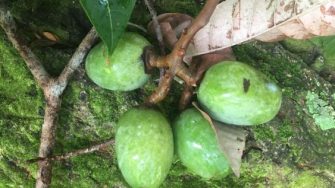
The use of Indigenous knowledge and resources – including bush foods and bush medicines – is increasingly on-trend. Cosmetics, pharmaceutical giants and large food producers are vying for everything from access to monopoly in the modern market.
From the Kakadu plum (or gubinge), an almond-shaped fruit found in Northern Australia, to gumbi gumbi, a plant known as Australia’s native apricot, bush foods are sought by health and beauty companies for their healing qualities.
Professor of environmental management Daniel Robinson has been working with Indigenous people in Asia, Australia and the Pacific Islands for the past 15 years to assert their rights in relation to biodiscovery, Indigenous knowledge and intellectual property, resources and land rights.
Biodiscovery investigates natural materials, such as plants, animals and other organisms, for compounds that may have commercial applications, such as pharmaceuticals, skincare and insecticides.
“Universities working in biodiscovery often partner with companies to finance their research on, for example, new molecules for drugs and medicines, new food products, herbal supplements, traditional medicines, cosmetics, creams and healthcare products,” he says.
Together with Dr Margaret Raven, a UNSW Senior Scientia Lecturer and Yamatiji and Noongar woman from Western Australia, Prof. Robinson supports Indigenous enterprises and communities to negotiate agreements between researchers and companies that ensure the fair and equitable sharing of benefits.
They also support communities to develop protocols to guide community members and outsiders in discussions about access to traditional knowledge and biological resources.
